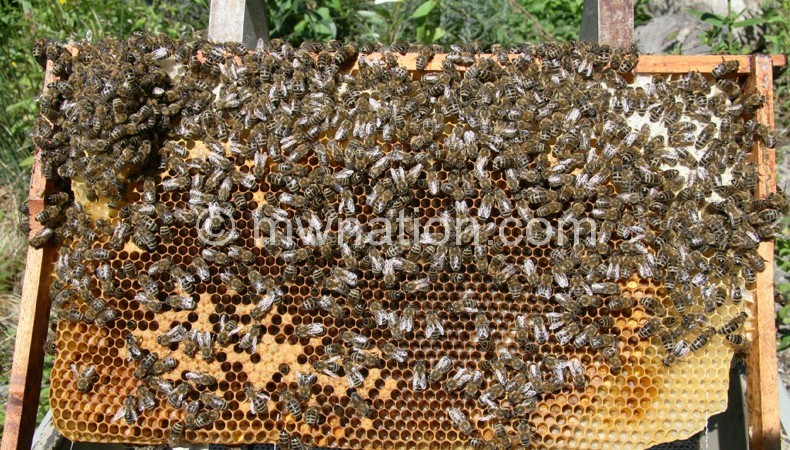Bee-keeping for income, forest protection
Felling of trees for charcoal-making provides the only source of income for many households. However, this is one of the major causes of deforestation in the country.
Though millions of trees are planted every year, there seems to be little progress in as far as reforestation is concerned.
Currently, most Malawians have already started experiencing the negative impacts of deforestation such as floods, among others.

Despite several efforts by government to ban charcoal burning business, there has been resistance as the traders have not been given alternative ways of sustaining their livelihoods.
While acknowledging that the trend has brought negative impact on the environment, James Jonas of Chapita Village in Neno said unless proper guidance is given on how he can find alternative sources of money, he cannot stop the trade.
“I have been in this business for 15 years now. I know the trade is bad as it has affected the environment, but do I have a choice?” Queried said Jonas.
During a media tour organised by Civil Society Agriculture Network (Cisanet) with funding from Christian Aid, another charcoal seller from the same area, Tadala Banda, said she would stop the business if given a chance to venture into agribusiness such as poultry farming, goat keeping as well as beekeeping.
For the past five years, Wildlife and Environmental Society of Malawi (Wesm) has been promoting bee-keeping in some districts. This has influenced farming communities from Traditional Authority (TA) Nthache in Mwanza to turn to beekeeping as a new source of income, replacing charcoal business.
They now have ample time to work in their farms and then meet in their groups afterwards to discuss how the keeping of bees is faring.
Milika Maunde of Mwaiwathu Group said she does not, at any point, think of going back to charcoal business as she has now found bee-keeping to be profitable and rewarding.
“Charcoal business is hard labour. To cut down a tree is not an easy job not to talk of burning it. It also comes with fire wounds, but after everything the profit does not tally with the amount of labour input,” she said.
Maunde also said profit aside, bee-keeping had reduced soil erosion because the cutting down of trees has reduced. Trees are now being used to place hives, making the area protected as people are now afraid of cutting down the trees because of the bees.
Laizio Matchona of Dzilima Village in the district, who had been in charcoal burning business for 20 years, now leads by example. Being a village head, he now has solar equipment, which his subjects use to charge their phones.
He also has a big radio as well as a sewing machine, which are also giving him extra money and, if not for beekeeping, his life would never be the same.
“Last year alone, we harvested over 150 kilogrammes of honey though our main challenge has been lack of proper markets.
‘We want government and other stakeholders to help us so that we can also visit our friends who are in the same business to share skills and ideas,” said Matchona.
Honey hunting and bee-keeping within the forest reserves and national parks were often banned in the past not only in Malawi, but also in Uganda and Rwanda yet they are the most natural and undisturbed environment excellent for bees. They were regarded as protected areas.
However, in the 1990s, new approaches to conservation emerged based around community participation and benefit as it was considered that local people would be motivated to participate in conservation if they would derive tangible benefits from doing so.
Throughout the last decade, many beekeeping projects had been initiated, a thing that has made many people to abandon more destructive activities such as charcoal burning in recognition that protected environment is good for bees.
As a result, people from Nthache are also making double profits from honey extracts such as Sera, which are used as cooking energy as well as candle-making from bee wax.
Through Wesm, they are now aware that honey also helps heal wounds and that a teaspoon of it before sleeping also helps children from bedwetting.
Wesm projects officer Masautso Chidothe said the project, whose primary objective is to mobilise and engage communities in Mwanza to undertake beekeeping as a natural resource enterprise for sustainable income, was targeting all the three T/As in the district, namely Kanduku, Govati and Nthache.
He said the project, which started in 2014 had already reached 600 individual farmers and expects to reach 1 000 at the end of the project in 2016.
According to a recent study on Non-Wood Forest Product Development (NWPD) by the Department of Forestry, honey seems to be the only product with a marketing system that is developing well.
It then says there is need for sustainable environment with regard to climate and vegetation, adaptive research to combine local with new knowledge as well as provision of capital to finance equipment if necessary.
The study also stipulates that business management training such as accounting and proper marketing systems, which are essential in bee-keeping, need enhancement. n





